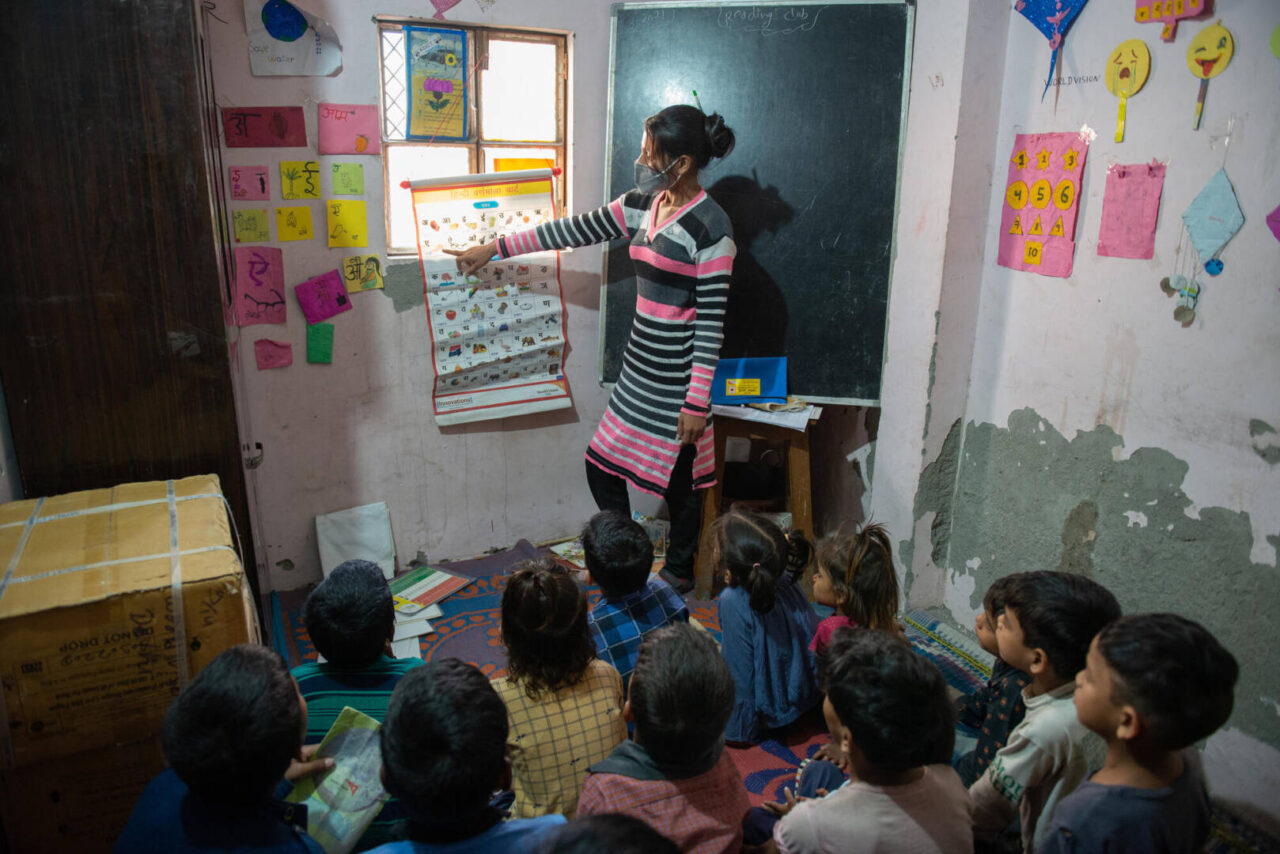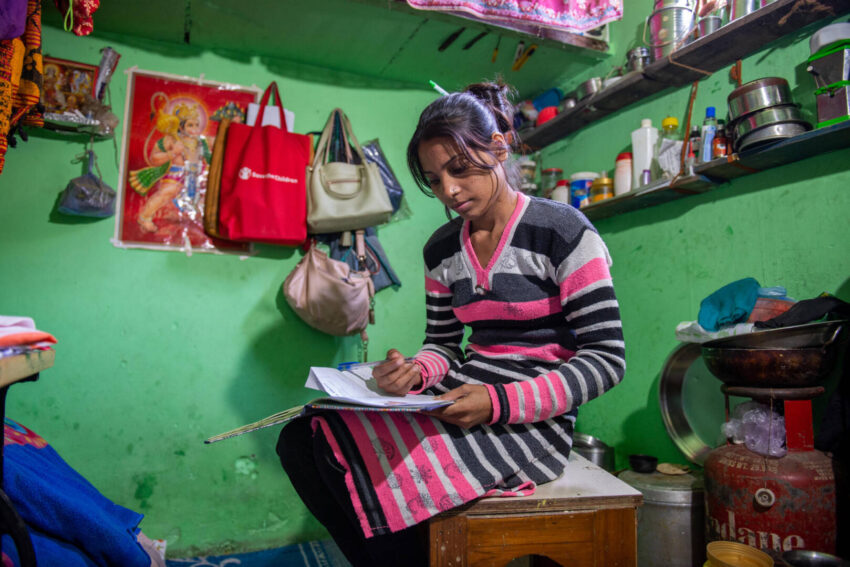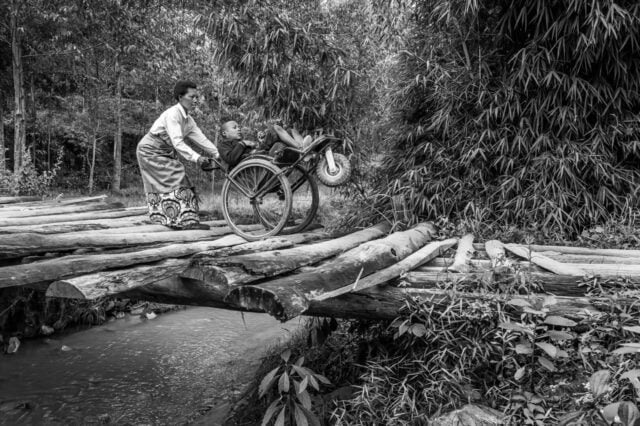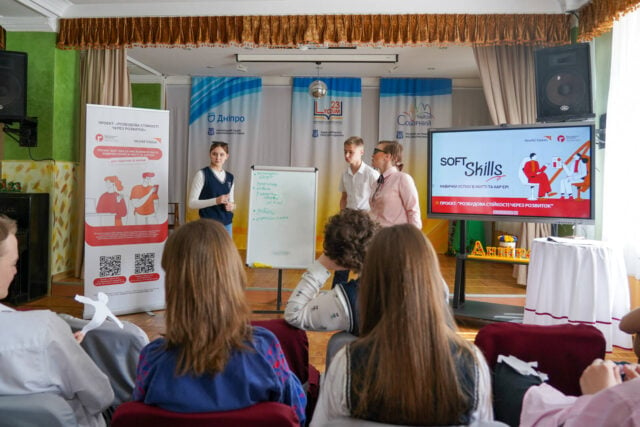Houses are built tall with narrow, dark alleyways separating buildings in the crowded, poverty-stricken area of northwestern Delhi, India. Families bundle into small rooms each night to lay their head. For 27-year-old Premvati, her mother, and three younger brothers, home is covered in bright green walls. Within the 64-square-foot room, two metal shelves holding kitchen supplies line one wall, clothes are in one corner, and a makeshift Hindu temple in another. Premvati spent many months within these walls when she was younger. At 4 years old, post-poliomyelitis syndrome paralyzed her right leg. “As a child, I was so afraid [of] people making fun of me. I never went out of the house, except when attending school. I was afraid of what people would say. I was even worried about what they would think of me,” says Premvati.
She’s since recovered from her muscle-weakening disorder, but the prolonged emotional scars healed more slowly. Doubts and fears made her feel insecure while she pursued higher education — the first person in her family to do so. But in 2013, while Premvati studied for her bachelor’s, she attended a World Vision awareness program for people with disabilities. “My mindset completely changed after I attended those programs. It motivated me a lot, and I accepted myself as I was. I also attended self-defense classes organized by World Vision, and after that, my confidence grew,” says Premvati. As her fears gradually disappeared, her compassion for children with a disability flourished.

Seasons of change
Before the year ended, Premvati began teaching at a World Vision disability center, where children with disabilities can learn. Most parents within the community work multiple daily wage jobs to make ends meet. In turn, they spend their days away from their children at home. “In our community, when parents go to work, older children look after the younger ones, so school dropouts are high,” says Premvati. Globally, 15% of children out of school have a disability.
Premvati learned that the centers allow for more specialized care that makes a difference. Sonam, who couldn’t open her palm, is now able to use her hands after daily exercises. Radha now walks after having surgery. Shravan now learns and plays with others when he used to cry because he couldn’t understand the curriculum. “At the center, we found that they [children with a disability] could have a better life if given a little more time and care,” shares Premvati, who not only cares for these children in her community, but also for kids seeking second chances.
Premvati now teaches at a learning center for children who have dropped out of school and want to return. World Vision’s Bridge and Unlock Literacy Centers in India help children continue their education. Unlock Literacy, a program implemented in more than 30 countries globally, aims to help children learn to read with comprehension. Because of high dropout levels in Premvati’s community, the team speaks with parents, advocating for their children to return to school. When children are back in the classrooms, Unlock Literacy helps ensure they excel.
Still serving
Unlock Literacy fills Premvati’s evenings while she continues to serve her community’s most vulnerable children during the day, teaching 14 children’s groups about social issues and child rights. She also works to ensure that primary healthcare is provided within the community, ranging from immunizations, supplementary food for people in need, and best practices trainings for pregnant and lactating mothers. Premvati is also part of World Vision’s Child Protection Committee that comprises men and women who help identify cases of child abuse, child marriage, and child trafficking within their community. Each is trained in preventative measures and steps to take should something occur. As Premvati is equipped to respond, she also looks to provide resources to families.
“Many people don’t know about disability pension. If I know someone with a disability, I make them aware of it. I’m [currently] in the process of helping a few people get that,” shares Premvati. So far, Premvati has acquired over 17 disability certificates for families with qualifying children. With this, families receive monthly stipends to help ends meet. The application process is tedious, and Premvati facilitates every step to ensure children with disabilities have better access to services.
Premvati has navigated her community’s cramped alleys countless times. Now she serves and cares for the most vulnerable within those walls, as she was once in their shoes. “When I was a child, I wanted to be a teacher and help children with disabilities. Now I’m doing just that even at my workplace.”
Amy Van Drunen of World Vision’s U.S. staff contributed to this article.


